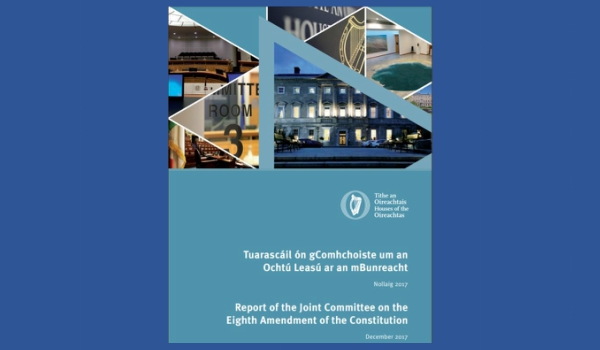
The Joint Committee on the 8th Amendment is an Irish parliamentary committee tasked to make recommendations on what should happen next as regards changing the abortion law in Ireland, following the publication of the report of the Citizen’s Assembly in 2017. These are excerpts from the report:
The Joint Committee agreed, in principle, at its meeting on 18 October 2017, that Article 40.3.3 should not be retained in full. This decision represented an acknowledgement by the Joint Committee that the current regime for the termination of pregnancy in Ireland is unfit for purpose and that constitutional reform is necessary…. No evidence adduced throughout the remainder of its deliberations has caused the Joint Committee to change its opinion with regard to the necessity for constitutional reform…. The Joint Committee recommends that Article 40.3.3 be repealed simpliciter (unconditionally)….
The evidence given to the Committee was that the operation of the Protection of Life During Pregnancy Act 2013 has created significant difficulties, some of which can only be addressed if the recommendations contained in this Report are adopted.
2.18. The Committee recommends that (a) termination of pregnancy should be lawful where the life or health of the woman is at risk and that a distinction should not be drawn between the physical and mental health of the woman, (b) provision for gestational limits for termination of pregnancy should be guided by the best available medical evidence and be provided for in legislation, and (c) any assessments in relation to the termination of pregnancy where the life or the health of the woman is at risk should be made by no fewer than two specialist physicians and the law should be amended to provide accordingly….
2.23 In view of the complexities inherent in legislating for the termination of pregnancy for reasons of rape or other sexual assault, the Committee is of the opinion that it would be more appropriate to deal with this issue by permitting termination of pregnancy with no restriction as to reason provided that it is availed of through a GP-led service delivered in a clinical context as determined by law and licencing practice in Ireland with a gestational limit of 12 weeks.
2.30 The Committee accepts that a gestational limit is not appropriate given that ultrasound anomaly scans are generally not provided before the 20th week of pregnancy and further scanning and testing may be necessary when a diagnosis is made.
2.31. The Committee recommends that it shall be lawful to terminate a pregnancy without gestational limit where the unborn child has a foetal abnormality that is likely to result in death before or shortly after birth.
2.35. The Committee recommends that the law should not provide for the termination of pregnancy on the ground that the unborn child has a significant foetal abnormality where such abnormality is not likely to result in death before or shortly after birth.
2.40. The Committee recommends that the law should be amended to permit termination of pregnancy with no restriction as to reason provided that it is availed of through a GP-led service delivered in a clinical context as determined by law and licencing practice in Ireland with a gestational limit of 12 weeks.
3.2. The Committee recommends that (a) Improvements should be made in sexual health and relationship education, including the areas of contraception and consent, in primary and post-primary schools, colleges, youth clubs and other organisations involved in education and interactions with young people. (b) Improved access to reproductive healthcare services should be available to all women – to include family planning services, contraception, perinatal hospice care and termination of pregnancy, if required. (c) All women should have access to the same standard of obstetrical care, including early scanning and testing. Services should be available to all women throughout the country irrespective of geographic location or socio-economic circumstances. (d) Improvements should be made to counselling and support facilities for pregnant women both during pregnancy and, if necessary, following a termination of pregnancy, throughout the country. Further consideration should be given as to who will fund and carry out termination of pregnancy in Ireland.
3.9. The Committee recommends that the law be amended to provide that (a) surgical terminations may only be legally carried out in a hospital setting (b) medical terminations may only be provided for through the licencing of medications for that purpose and prescribed by a qualified practitioner acting in good faith.
3.10. The Committee further recommends that where terminations occur in such circumstances (a) no criminal sanctions should apply, and (b) in cases where a woman procures or seeks to procure an abortion for herself, the law should provide that, regardless of circumstances, she is not guilty of an offence.
SOURCE: Report of the Joint Committee on the Eighth Amendment of the Constitution, December 2017



